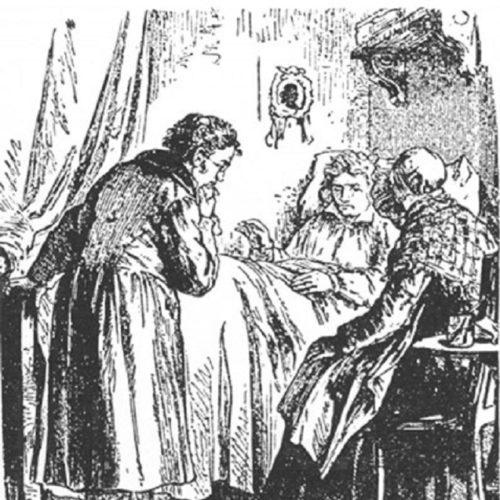Who do I have to kiss to get a drink round here?
mainWelcome to the 108th work in the Slipped Disc/Idagio Beethoven Edition
Der Küss, opus 128
As Beethoven lay dying, the vultures descended. Friends, neighbours, acquaintances, passers-by, tourists and tradesmen, all popped in to see how he was getting on, some to make off with whatever they could. Any portable possession that might have value as a posthumous trophy was taken. While he slept, people cut off locks of his hair.
One was the young composer Ferdinand Hiller whose motives were slightly purer. Hiller thought the lock might somehow lead him to the physical secrets of Beethoven’s genius. The gruesome relic languished in his family for a century and more until it was put up for sale. There was a regular trade in the auction rooms in locks of Beethoven’s hair, some of them genuine.
One came into the possession of Dr. Alfredo Guevara, an attention-seeking urologist in Arizona, near the Mexican border. Guevara subjected the lock to multiple laboratory tests in an effort to support his contention that Beethoven’s failing health and death were caused by syphilis. Relying on a memoir by a Viennese cellist, the good doctor convinced himself that Beethoven consorted with prostitutes and caught his death of the pox. Most musical scholars think this unlikely.
Beethoven was a prudish man, embarrassed by talk of sex. He fought long and hard to stop his brother from marrying a woman of what he considered to be loose morals, and he wrested his nephew away from her care after his brother died. He disapproved of Mozart’s opera Don Giovanni for its licentiousness. He shunned people who were living in sin, even aristocrats who could have been of good use to him. He may have enjoyed a night out getting drunk with a cellist but he was not the kind of man who relieved his urges in a brothel, even when drunk.
Beethoven had grown up with his father’s alcoholism and bawdiness, and with his mother’s accusations of licentiousness and infidelity. It may well be that his inability ever to form a relationship with a woman stemmed from a deep-seated fear of sex, that it might deflect him from the path of righteousness and from his creative destiny. By his last years he had put all thoughts of romance and desire behind him.
So it comes as a considerable shock to find that Beethoven, high-minded and in the midst of writing the Missa Solemnis, broke off his spiritual quest to write a little ditty called The Kiss. We have no idea why he did it.
The words are by Christian Felix Weisse, whose poems had previousy been set by Mozart. The text reads as follows:
I was with Chloe all alone,
And really wanted to kiss her:
But she said she would give a shriek,
That nothing would come of it.
But I got brave and kissed her,
Notwithstanding her resistance.
And did she shriek? Oh yes, she shrieked.
But that was a long time after.
I find this insignificant song incredibly reassuring. A broken man, cut off by his deafness, has a sudden impulse to be young again, to snatch a kiss from a passing Chloe, to give himself and her the satisfaction of human connection. What could possibly be more uplifting?
Fritz Wunderlich sings the song fabulously. In a lower register, so does Olaf Bär.

*
String Quintet in C major WoO 62 ‘Letzter musikalischer Gedanke’
Among those who visited Beethoven as he lay dying was Franz Schubert, a young Viennese who had once accused the great man of writing ‘bizarre music’ but soon became his sworn admirer, dedicating to Beethoven in 1822 his first major instrumental publication, the Variations on a French Theme for Piano Duet, op.10 (D 624).
They are thought to have met as customers at Steiner’s music shop and possibly one summer at Baden. Reports of a conversation taking place between them are spurious. Days before Beethoven died, Schubert visited his room with Josef Teltscher and two brothers Joseph and Anselm Hüttenbrenner, but the dying man was apparently unaware of their presence.

Schubert was a torchbearer at Beethoven’s funeral, and played at a concert in his memory. Schubert’s C major String Quintet (D956) is thought to be a tribute to the unfinished string quintet WoO62 that Beethoven began in the same key in the last months of 1826.
Brought tragically young to his own deathbed, eighteen months later, Schubert asked friends to perform Beethoven’s C sharp minor String Quartet, opus 131. He then requested to be buried next to Beethoven, which his grieving father was able to secure.
The Slippedisc/Idagio cycle will now take a two week break before scaling the final Beethoven summits.






To echo one commentator on Wunderlich, “das ist lieb.”
Thank you, and have a wonderful, safe and healthy pause.
The Wunderlich led me back to “Morgen,” and the Schubert back to Beethoven, as well as
to some good reading about both.
This is the internet “at its best.”
“Der Küss”
And Nurnberg said: Very funny, now get back here.
*sigh*
@NL:
It’s Kuss, not Küss.
We’re no Russians: If there’s an “Ü”, we mean (and write) it. (Russians tend to write “e” (pronounced “ye”) instead of “ё” (pronounced “yo”), and that’s why you guys never pronounced Gorbachev or Pletnev right. 😉 )
Ÿöü cännöt jüst släp döts ön ёvёrÿ wörd ÿöü sёё.
“WHO DO I HAVE TO KISS TO GET A DRINK ROUND HERE?”
As a long-time reader of thrillers and detective novels both good and not-so-good (it’s my guilty pleasure), I must point out that this headline has been sanitized. Stuart Woods, in his Stone Barrington novels and others, uses this phrase often, but he substitutes a somewhat more colorful word in the place of “kiss”.
I happen to despise it in both its forms.
And I certainly do not consider a lock of hair a “gruesome relic”. I wish I had the presence of mind to save a lock from my mother’s lovely auburn hair at the time of her death.
The story of Beethoven’s Hair by Russel Martin is worth a read. Forensic examination of the hair did not reveal syphilis.
It should be “Der Kuss”. The combination “Der Küss” doesn’t exist in German. Not everything is an umlaut!
After bearing torches in Beethoven’s cortege, Schubert and his friends repaired to a Weinstube where he offered the first toast: “To the next great composer to die.” It was, of course, to be himself, the next year.
Snselm Huettenbrenner later had to be tricked out of the ms of Schubert’s unknown and unpublished “Great” C -major symphony by a pretended interest in H.’s own works
Jan Swafford makes a powerful case Beethoven died of cirrhosis of the liver a result of excessive alcohol intake. In his final days he was drained repeatedly of large amounts of abdominal fluid a classic symptom of liver failure